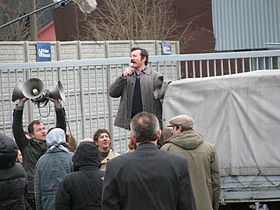Wałęsa. The man of hope
| Movie | |
|---|---|
| German title | Wałęsa. The man of hope |
| Original title | Wałęsa. Człowiek z nadziei |
| Country of production | Poland |
| original language | Polish |
| Publishing year | 2013 |
| length | 119 minutes |
| Rod | |
| Director | Andrzej Wajda |
| script | Janusz Głowacki |
| music | Paweł Mykietyn |
| camera | Paweł Edelman |
| cut | Milenia Fiedler, Grażyna Gradoń |
| occupation | |
| |

Wałęsa. The Man of Hope (Original title: Wałęsa. Człowiek z nadziei ) is a Polish biographical film by the director Andrzej Wajda about the life of Lech Wałęsa , the Solidarność leader and President of Poland . The 2013 film closes Wajda's film triptych about a man's struggle against the totalitarian communist system based on The Man of Marble (1976) and The Man of Iron (1981).
action
Lech Wałęsa, an electrician from the Lenin Shipyard in Gdansk , took part in the demonstrations in Gdansk in 1970 . While he remembers the bloody crackdown on the protests, he concentrates on his day-to-day duties. Ten years later, the Gdańsk shipyard strikes again and he becomes an unexpected, charismatic leader of the striking shipyard workers. This is the beginning of a new citizens' movement that has successfully withstood the communist regime. Wałęsa is pushed into the role of representing the working people of Poland . The Soviet Union , previously considered too frightening to criticize its policies, had cut itself into its own flesh. With the Solidarność movement, the Poles are an example of the fact that you only have to dare to do something to oppose the totalitarian regime of communism. In doing so, they sparked hopes throughout the Eastern Bloc countries and created a domino effect . The citizens of the GDR z. B. followed the Polish example and began with the Monday demonstrations in 1989/90 and achieved German reunification through the fall of the Wall and peaceful revolution in the GDR . The Soviet Union is disintegrating, as is the multi-ethnic socialist state of Yugoslavia . While Europe is being reshaped again, the new Poland will remain stable and peaceful after 1989 . Nevertheless, a huge number of parties developed in the Polish parliament , which brought Poland to the brink of ungovernability, like Germany once did in the late Weimar Republic . Lech Walesa took the people ask of themselves as presidential candidate to make available and was largely elected president of the new, democratic Poland. But now the people believe that Wałęsa's level of education is insufficient for the office. Those driven by such thoughts are now looking for ways to depose him until they finally dig so deeply into Wałęsa's life that they find dubious decisions that Wałęsa once made during his time as an electrician, when he looked after everyone as a result of his people's high expectations of him Hopes raised and at times broke because of it.
Reviews
In April 2011 Andrzej Wajda told The Guardian that he intended to make a film that would put Lech Wałęsa in a new light. The screenwriter Janusz Głowacki was quoted as saying The film is not just going to be romanticism. There will be irony, too. Do not worry. Wajda later stated at a press conference that the Nobel laureate and former Polish president Wałęsa had simply accepted his project in silence. He also stated that he found shooting the film to be the toughest challenge of his career to date. Wajda couldn't help but quote the famous slogan of his friend Lech Wałęsa: Nie chcę, ale muszę (I don't want to, I have to).
At the Academy Awards 2014 , the film was submitted as a Polish entry for the Best Foreign Language Film award, but received no nomination.
Awards
- Polish US Film Festival in Chicago 2013: Audience Award, "Srebrny Hugo"
- Bilet, Nagroda Stowarzyszenia “Kina Polskie” 2013 - Złoty Bilet
- Polish Film Festival 2014: nomination in the categories of Best Scenography, Best Costume, Best Editing, Best Actress, Best Actor
Web links
- Official website of the film (Polish)
- Entry on filmpolski.pl (Polish)
- Wałęsa. The man of hope in theInternet Movie Database(English)
- Video of the film plans from 2012 at Polski Instytut Sztuki Filmowej
Individual evidence
- ↑ Wałęsa. Człowiek z nadziei - World premiere of the film by Andrzej Wajda in Venice. Report from the Polish Institute in Düsseldorf
- ↑ Gdansk hosts Walesa biopic . Polskie radio. January 12, 2012. Accessed March 14, 2014
- ↑ Wałęsa. Man of hope ( Memento from October 12, 2013 in the Internet Archive ). Akson Studio. Accessed March 14, 2014
- ↑ Helmer's solid look at Solidarity ( Memento from July 28, 2012 in the web archive archive.today ). In: Chicago Tribune. Accessed March 14, 2014
- ↑ Borger, Julian (April 4, 2011): Andrzej Wajda film will shine new light on Lech Walesa . In: The Guardian. Accessed March 14, 2014
- ^ Director Andrzej Wajda begins shooting Lech Walesa film . CTV , November 24, 2011. Accessed March 14, 2014
- ↑ Wajda To Make Walesa Biopic . November 25, 2011. Accessed March 14, 2014
- ↑ Scislowska, Monika (24 November 2011). Oscar-winning director starts film on Lech Walesa. In: The Washington Times. Accessed March 14, 2014
- ^ Roxborough, Scott (September 18, 2013). Oscars: Poland Nominates Andrzej Wajda's ‚Walesa 'in Foreign-Language Category . In: The Hollywood Reporter. Accessed March 14, 2014
